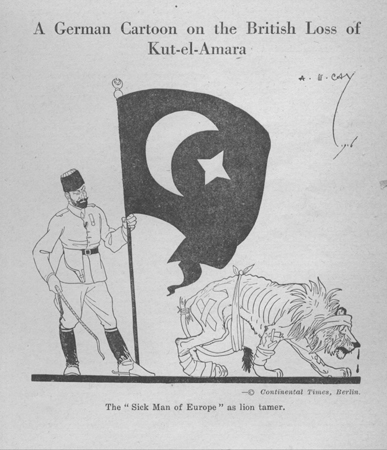Saturday, October 25th 2014

General Townshend entered Kutu’l-Amare in 29th September 1915. The Ottoman forces withdrew and reinforced “Selman-i Pak”, under the command of Colonel ‘Bearded Nurettin Bey’.
While the reinforcement continued, Mirliva Halil Pasa the uncle of Enver Pasa, entered the frontline with a corps and changed the cause of the battle. General Townshend, with 4500 loss regressed Kutu’l-Amare.
One of the frontline in which the Ottoman Empire had to defend in the First World War was Iraq, for the reason of it being the UK’s target because of the oil bearings it contains. UK started the preparations for the occupation on September 1914 and gathered the Iraq expeditionary forces, which consisted of Indian and British soldiers, on the Bahrain islands. Then occupied Basra on 22nd of October 1914. Suleyman Askeri Bey was assigned to stop these Indian-British forces commanded by General John Nixon from proceeding in Iraq, which was ruled by the Ottoman for almost 400 years. There were insufficient amount of soldiers on the frontline, so just like in Trablusgarp, Suleyman Askeri Bey tried to get organised with the local Arab militia. After being defeated in the Basra attack, Suleyman Askeri Bey committed suicide. Meanwhile, the commander in charge of the British that seized Nasiriye and Amare was General Charles Townshend, who will later on be a mediator between the British and the Ottoman Empire for the Armistice Truce.
Despite him seeing it dangerous to continue, his seniors, thinking its essential to seize Baghdad as soon as possible ordered him to continue the operation. General Townshend entered Kutu’l-Amare in 29th September 1915. The Ottoman forces withdrew and reinforced “Selmani Pak”, under the command of Colonel ‘Bearded Nurettin Bey’. While the reinforcement continued, Mirliva Halil Pasa, the uncle of Enver Pasa entered the frontline with a corps and changed the cause of the battle. General Townshend, with 4500 loss regressed Kutu’l-Amare. Due to its geographical location, this town being on the coast of The River Tigris was a trap for the British-Indian army. While General Townshend, having no choice left but to keep position here was reinforcing the town, Mirliva Halil Pasa commanded his troops to make a manoeuvre to close the circle of the siege.
Mirliva Halil Pasha being aware of the situation of the enemy, while closing the circle, offered the British to surrender as they don’t have another choice. With the rejection of this proposal, the siege of Kut began on the 7th of December 1915 which lasted for 143 days, 29th April 1916. While attempting to split the siege line, General Townshend had to face with not only the Ottoman soldiers but with the problems that occurred within his army. This was because the Indian soldiers in the 6th division, especially the ones that are Muslim and don’t want to fight against their own brothers in religion, which led to discipline problems, desertion and mutiny. Mirliva Halil Pasa by writing out leaflets tried encouraging the Muslim soldiers to join the Caliph’s army and inviting the non-Muslim soldiers for rioting over British imperialism.
Meanwhile, the necessary measures were being taken to stop the British forces coming over Basra, the general headquarters combined the forces in Iran, Iraq and Mosul into two divisions making it 5th army and gave it under the command of the German Marshal ‘Von Der Goltz Pasa’. Mirliva Halil Bey was then appointed as the commander of the frontline. The British took initiative with General Fenton Alymer to save Townshend’s forces. When it was 22nd March 1916, Times newspaper wrote, the situation of Townshend was extremely dangerous.
The failure of both the British in Kutu’l-Amare and the British sent to help them, with heavy casualties, caused diseases and decrease of provisions. After all of the fruits, vegetables and canned foods eaten up, the oxen were eaten. When these were finish the British soldiers began eating the horses and mules. Not eating these because of religious reasons, the health of the Indian troops were getting worse day by day. Although General Townshend, to persuade the Indian soldiers to eat horse meat, asked the British authorities in India to take words from the religious leaders that eating horse meat is permissible the Indian soldiers refused to eat it and became weak.
One of the soldiers fighting in Kutu’l-Amare explained this situation as follows: “We slaughtered the first horse 3 weeks ago. After that day we slaughtered 20 a day, we had meat but it wasn’t meat. Minced horse meat, horse soup cooked in pot, stuffed with horse meat. The British soldiers that eat horse meat has more strength compared to the Indian battalions that refuse to eat horse meat.” Via the newspapers, this situation was also carefully monitored by the Ottoman public. For example, ‘Tercüman-ı Hakikat’ newspaper, based on the news on Times newspaper says: “Time newspaper, about the situation in Iraq admits that with the latest official evidence the situation of the Englishmen around Tigris is a reason for many concerns. The same newspaper publishes a report about the corruption of the British administration in Iraq saying: “We received complaints of the things that have been done between the Tigris and Euphrates rivers. They specifically complain too much of the Indian officials. In supplying the needs of the war the Indian officials are equal with the London officials.
News and complaints reported to us, are proof of the failure of the sanitary completely. Heavy wounded soldiers remain without treatment for two three days. The first aid for the injured are being done only after two three days. The ships sailing down Tigris are full of injured men. The condition of the injured that arrive to Bombay are very critical. The wounds open up because of the heavy rain.
The Indian sanitation is responsible for this terrible condition. Especially at the last stage of the Iraq war, the Indian sanitation is completely ruined. Malcolm, a member of the parliament, in a letter he wrote said: “It is reported that the condition of the soldiers at the Iraq front line are very severe. Food supply and clothing for the soldiers are insufficient which is very worrying. Thousands of patients are treated by only three doctors. The bandage stock is insufficient. Operations being done without anesthetize. Five hundred injured are under the supervision of one caretaker. Only a few carriers are helping out the caretakers. An officer wounded from foot has not been looked after and his bandages aren’t changed. I demand an explanation from the government regarding this bad situation. They can not get rid of the responsibility by stating that the sanitary belongs to India. Now that the UK government is sending their sons to Iraq, failing to look after them is in governments responsibility.”
While this situation caused changes in the British commanding group and bad reactions from the public, General Townshend, hoping that a he will receive help, have rejected the second proposal from Halil Pasa to surrender by saying: “Turks are always people who are good soldiers and noble during combat but I do not yet think to surrender.” The British headquarters, despite of everything started trying untried ways to supply their besieged forces with food and ammunition. For the first time in the war history, in 15th-29th April 1916 tried to help from air using Short 184 type 225 HP seaplanes. The last attempt to help the besieged British army was done on the night of 12th April 1916, by “Julnar Ferry” carrying 270 tones of food supply, various weapons and three machine guns. This was the ferry sent from Felahiye that was inactivated with the captain and the crew. After the last defeat in Iraq British General command, commanded General Townshend to take care on his own because of no hope left for them from the siege by Halil Pasa in Kutu’l-Amare.
General Townshend began negotiations for surrendering, and as a last attempt to save his army, he offered to bribe Halil Pasa which was regarded as a joke by him. This proposal was repeated by the famous British spy Lawrence but was rejected. The bribe offer to Halil Pasa was announced to the Ottoman Public by Tercuman-i Hakikat newspaper with the following words, with the headline: “The offer from Townshend to get away” and continuing: “Although General Townshend offered to be let gone freely along with his army for a payment of a million Pounds, all of the canons he has in hand and Kutu’l-Amare. This laughable offer was immediately rejected.
As a result, General Townshend, by receiving an approval from the headquarters unconditionally surrendered with his army on 29th April 1916. The victory aroused a great repercussions in the foreign and local press. In the Tercuman-i Hakikat newspaper, it has been published with the headline, “The Biggest Disaster Of The British In History”. The news continues saying, “It is announced by the Headquarters that, General Townshend and his army of 13,000 men, that was stranded in Kutu’l-Amare, has started to be taken as captives of war. Today, the Turkish army, once again risen the Ottoman flag with a new glory and honour. For the past several days, in the British sources, the thought for the fall of Kutu’l-Amare was being felt. The result was what the British were afraid of but we waited impatiently for. So the British, but now much worse, felt the pain of the Turkish bayonet this time in Iraq, just like in Canakkale. These defeats that follow each other explicitly show that the future star of the British is fading away.” This news, not only stateside but abroad, was a reason happiness. The German Emperor, Austrian King, King of Saxony and allies as such congratulated by letter. On the victory of Kutu’l-Amare, the city of Vienna was decorated by Turkish flags.
This shaded or even a bit forgotten victory was settled in the memory for being, “The most abject capitulation in the British history.” Never forgetting the defeat here, while General Townshend in his memories wrote, “The British government promised to save me if I withstand, I made it for five months but unfortunately the promise wasn’t kept… If I owned the Hell and Kutu’l-Amare I would have sold Kutu’l-Amare and held the Hell.” One of the British soldiers, William Spackman: “Everyone was devastated. I’ll never forget that terrible morning of surrendering, which gave the feelings of worthlessness. We started doing the melancholic work for surrendering. Poor gunners, some of them couldn’t stop the tears while dismounting their gun that they used to look at with pride. The Turks came at midday and took over the positions. We sat on the edge of Babylon water side and we cried. Years later, the officers who experienced the siege, have established “Society of Kut.”/worldbulletin/
Etiketa: ottoman empire, The Kutu'l-Amare Siege



